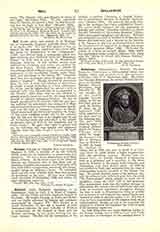

Bellarini, JOHN, Barnabite theologian, b. at ‘Castelnuovo, Italy, in 1552; d. at Milan, August 27, 1630. He was Visitor and twice Assistant General of his order. He taught theology at Padua and Rome, and was highly esteemed by bishops and cardinals, particularly by Gregory XV. Best known as a moral theologian, he has left a number of solid theological treatises, the most valuable of which is a commentary on the Council of Trent and the Roman Catechism, in two parts, forming two distinct volumes. The first, for the instruction of the faithful, is entitled “Doctrina d. Concilii Trideutini et Cathechismi Romani de Symbolo Apostolorum” (Brescia, 1603). The parts of this work relating to the decalogue have been published in French. The second work, designed for the conversion of heretics, and entitled “Doctrina Catholica ex Sacro Concilio Tridentino et Catechismo Romano” (Milan, 1620), has passed through several editions. Bellarini also composed a number of booklets in Italian for confessors and penitents, and a treatise on the doctrine of St. Thomas on physical predetermination and on the determination in general of all things and causes into active operation (Milan, 1606). He is also the author of a work on method (Milan, 1606), which was republished under a slightly different title, along with his “Mirror of Divine and Human Wisdom” (Milan, 1630).
S. H. FRISBEE

